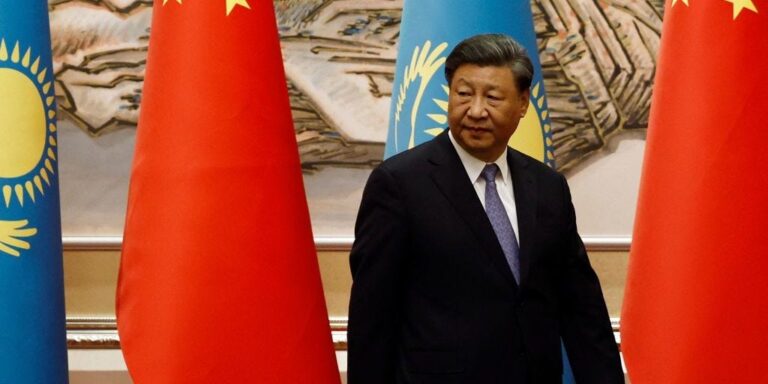- Members of the Shanghai Cooperation Organisation are meeting in Kazakhstan on Wednesday.
- This comes amid growing tensions between two of the group’s most powerful members.
- Russia and China are competing for influence in Central Asia.
Leaders of countries that Russia and China tout as counterweights to Western global power are meeting in Kazakhstan this week.
Russian President Putin is scheduled to meet with Chinese President Xi Jinping at the Shanghai Cooperation Organisation (SCO) in Astana, the capital of Kazakhstan.
During the talks, the two men will reportedly explore ways to expand the organisation as part of their shared mission to roll back US global power.
But despite their “no-holds-barred” cooperation brokered by a shared hostility toward the United States and its NATO allies, the rift between friend-foe Putin and President Xi Jinping is widening.
Ukraine has shifted the balance of power
The leaders are engaged in fierce competition for influence over the Central Asian states of Kazakhstan, Kyrgyzstan, Tajikistan and Uzbekistan, all former SCO members.
The SCO was founded as a regional security pact but has expanded in recent years to include India, Pakistan and Iran. Belarus, another NATO foe, is expected to join this week.
The Central Asian countries were once part of the Soviet Union and are traditionally considered part of the Kremlin’s sphere of influence.
However, the war in Ukraine has shifted the balance of power.
Russia’s invasion of Ukraine has drained the Kremlin’s resources, money and energy, while countries that trade with Russia risk Western sanctions.
Meanwhile, Beijing has quietly taken the upper hand, brokering trade deals and building political influence in the region.
“The war in Ukraine has demonstrated to Central Asian states that diversifying their connections to the world is key to a successful presence in the region,” Temur Umarov, a research fellow at the Carnegie Russia and Eurasia Center, told The Guardian.
To further strengthen trade ties, China is building auto factories and power plants in Ukraine and Kazakhstan, brokering a surveillance software deal, and expanding a direct rail line to Kazakhstan.
Trade between China and Central Asia is expected to grow 27% in 2023 to reach $89 billion, according to Chinese customs data.
Russia is likely concerned about these developments, but there is not much it can do about it.
Unfair partnership
As Western countries seek to isolate Russia over the war in Ukraine, Russia has become increasingly reliant on China for diplomatic and economic support.
“The importance of China’s aid and indirect support to Ukraine is a priority for Moscow and will shape its approach to Beijing as long as the conflict with the West continues,” Emil Avdaliani, a professor of international relations at the European University in Tbilisi, wrote for the Centre for European Policy Analysis in January.
Russia is seeking to boost trade with Central Asian countries, reportedly using them to obtain goods banned by Western sanctions, but it cannot match China’s economic might.
Russia touts its ties with China as evidence of the West’s failure to isolate Russia, but it is a friendship that comes at a high price.
“We have friendly relations with Russia, but at the same time we are looking at opportunities,” Mirshohid Aslanov, founder of the Tashkent-based think tank Center for Progressive Reforms, told The Wall Street Journal. “We are looking east very eagerly.”

